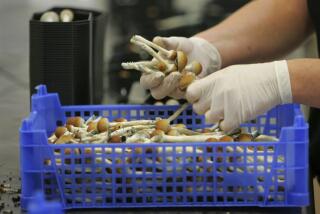Medical pot provider’s sentencing postponed
- Share via
A federal judge in Los Angeles on Monday postponed the sentencing of man who emerged as a key figure in the national debate over medical marijuana, saying he wanted additional information about a reported change in the Justice Department’s policy regarding such prosecutions.
U.S. District Judge George H. Wu asked prosecutors for a written response from the Justice Department about its position on medical marijuana prosecutions in light of recent comments from Atty. Gen. Eric H. Holder Jr.
Holder said last week that the Justice Department under President Obama had no plans to prosecute dispensary owners who operated within their state law.
Wu said he did not believe that any change in policy would affect the conviction of Charles Lynch, 47. But the judge said he wanted to consider any new information about the policy before imposing sentence.
Lynch is facing a mandatory minimum of five years in prison under federal sentencing guidelines.
Assistant U.S. Atty. David Kowal told Wu he didn’t think it would be appropriate for the judge to consider any change in policy as it relates to Lynch’s impending sentence.
But wouldn’t such a change “reflect somewhat on the seriousness of the crime?” Wu asked.
“I don’t think so, your honor,” the prosecutor replied.
At one point, as Kowal sought clarification on what information Wu wanted, he asked the judge why he wanted it.
“I don’t have to justify as to why I want the information,” the judge replied.
Lynch’s trial last summer showcased the issue of conflicting state and federal marijuana laws.
Cultivating, using and selling doctor-recommended medical marijuana is allowed under some circumstances in California and a dozen other states, but federal law bans the drug altogether.
Lynch, of Morro Bay, had argued at trial that he had the blessing of the mayor and other city officials when he opened Central Coast Compassionate Caregivers in 2006. Lynch’s defense attorneys wanted to present evidence that he was providing a service to seriously ill patients for whom doctors had recommended marijuana. But they were barred from doing so because the U.S. Supreme Court has concluded that why someone distributes marijuana in violation of federal law is irrelevant.
Prosecutors portrayed Lynch as a cynical entrepreneur who took advantage of the state’s medical marijuana law to sell about $2 million worth of the leafy drug over a roughly one-year period beginning in 2006 until his store was raided by the authorities. They accused him of carrying around a backpack stuffed with cash, like a common drug dealer.
--
More to Read
Sign up for Essential California
The most important California stories and recommendations in your inbox every morning.
You may occasionally receive promotional content from the Los Angeles Times.














